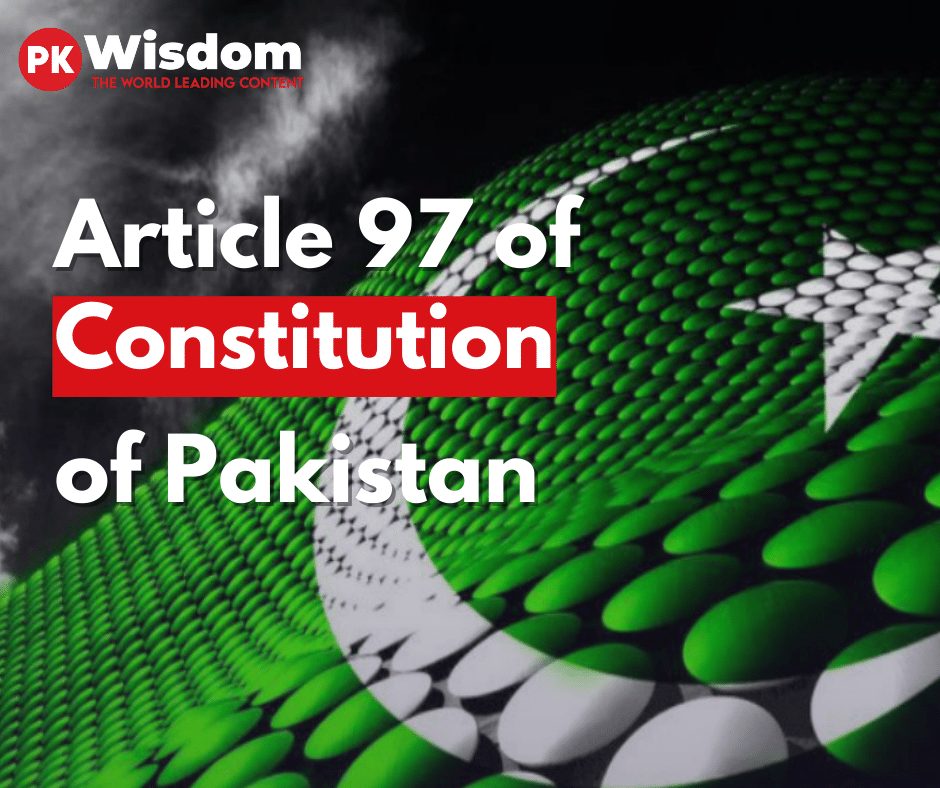Overview of Article 97 of the Constitution of Pakistan
Embedded within the constitutional framework of Pakistan, Article 97 serves as a cornerstone in defining the scope of executive authority for the Federation. Enacted in the 1973 Constitution, this article delineates the parameters within which the central government can exercise its powers. This blog post delves into the intricacies of Article 97, unraveling its significance, key points, and the delicate balance it strikes between federal and provincial jurisdictions.
Article 97 States
97. Extent of Executive Authority of Federation.
Subject to the Constitution, the executive authority of the Federation shall extend to the matters with respect to which Majlis-e-Shoora (Parliament) has power to make laws, including exercise of rights, authority and jurisdiction in and in relation to areas outside Pakistan:
Provided that the said authority shall not, save as expressly provided in the Constitution or in any law made by Majlis-e-Shoora (Parliament), extend in any Province to a matter with respect to which the Provincial Assembly has also power to make laws.
Key Points of Article 97 of the Constitution of Pakistan
- Scope of Executive Authority: Article 97 sets the stage by delineating the scope of the executive authority of the Federation. This authority is not absolute but is explicitly subject to the provisions of the Constitution.
- Legislative Powers of Parliament: Executive authority extends to matters for which Parliament has legislative powers. This link between executive and legislative powers underscores the constitutional principle of separation of powers.
- Jurisdiction Outside Pakistan: A unique feature of Article 97 is the extension of executive authority beyond Pakistan’s borders. The central government is empowered to exercise rights and authority in areas outside the territorial confines of the country, reflecting the global context in which governance operates.
- Limitation on Provincial Matters: The crux of Article 97 lies in its limitation clause. While the Federation’s executive authority is extensive, it is explicitly curtailed in provinces. The provision ensures that the central government’s authority does not infringe upon matters for which the Provincial Assembly has legislative powers.
- Safeguards for Provincial Autonomy: By preventing the executive authority from extending into provincial jurisdictions, Article 97 acts as a safeguard for provincial autonomy. This provision aligns with the federal structure of Pakistan, recognizing the distinct legislative domains of both the central and provincial governments.
Download the Constitution of Pakistan in PDF
Crux of Article 97 of the Constitution of Pakistan
At its core, Article 97 strikes a delicate balance between the centralized authority of the Federation and the autonomy of provincial governments. By clearly defining the limits of executive authority, the provision ensures that powers are distributed in a manner that respects the diverse needs and aspirations of different regions within Pakistan. It safeguards against the concentration of power at the federal level, fostering a system that values both unity and diversity.
Conclusion: Article 97 of the Constitution of Pakistan
In conclusion, Article 97 emerges as a linchpin in Pakistan’s constitutional architecture. Its nuanced provisions underscore the commitment to a federal system that respects the autonomy of provinces while maintaining the overarching authority of the central government. As we navigate the intricacies of the 1973 constitution of Pakistan, Article 97 stands tall, symbolizing the wisdom of the framers in crafting a governance structure that accommodates diversity and ensures a harmonious balance of powers.


